01. Ten Years After - I'm Coming On
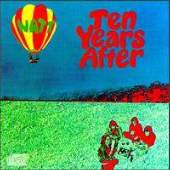
Taken from "Watt", their 6th album, released in 1970, and the last album to be released on the Deram label. The band, who evolved out of The Jaybirds, were formed in the UK in 1966 by guitarist/vocalist Alvin Lee, bassist Leo Lyons, drummer Ric Lee and keyboard player Chick Churchill. They signed to Deram and they released their eponymous album in 1967. Their big break came when they appeared at Woodstock, by which time Alvin Lee had developed quite a name as being one of the fastest guitarists around at the time. Further albums such as "SSSHH" in 1969 and ''Cricklewood Green" the following year cemented the band's reputation as one of the UK's best blues/rock outfits. They then moved to Chrysalis Records in 1972 and they released ''A Space In Time" that year. In an effort to shake off the blues/rock tag, the album was an offbeat selection of material, but it failed to have the desired effect and it eventually led to the band's dissolution in the mid 70's. Ric Lee went on to work with Stan Webb's Chicken Shack towards the end of the seventies. Alvin Lee collaborated with American guitarist/vocalist Mylon Lefevre on the album ''On The Road To Freedom" in 1973 and then formed his own band (Alvin Lee & Co), and then Ten Years Later, with whom he toured Europe in 1978 to 1980. He released around nine solo albums before Ten Years After reformed in the late 80's and released the excellent "About Time", their first studio album in 14 years. Unfortunately not much came of this reunion, other than a "Live 1990" album, and the band was put on ice again. In the early 2000's, a new Ten Years After, with Ric Lee, Chick Churchill and Leo Lyons, together with a brilliant young guitarist called Joe Gooch, exploded on the scene with a new live album, "One Night Jammed", of classic and newer TYA material, plus a few great covers, recorded in Germany in February 2003. No-one is saying that it's easy to fill Alvin Lee's boots, but Joe Gooch is a more than able substitute and he fits in perfectly with the rest of the band. The band then released a fantastic studio album, "Now", in 2004. TYA are definitely back with a new vigor and they're sounding great! A new live album has also just recently been released.
02). If - Borrowed Time
A very different version of the jazz/rock outfit who were formed in the late 60's by sax player Dick Morrissey and guitarist Terry Smith. The original If released five albums between 1970 and 1972, releasing the imaginatively titled ''If", "If 2", "If 3", "If 4" and "Waterfall". Every original member of the band, baring Morrissey, then left, with drummer/vocalist Cliff Davies (who replaced Foreigner-bound Dennis Elliot), bassist Kurt Palomacki, guitarist Steve Rosenthal, keyboard player Pete Arnesen and pianist/vocalist Fi Trench joining, and this line-up recorded 1973's "Double Diamond" album. (Interestingly enough, other original members such as Terry Smith and sax player Dave Quincy went on to form Zzebra with Osibisa's Loughty Amao, keyboard player John Mealing went on to work with the likes of The Who's John Entwistle and Decameron, and vocalist J.W.Hodkinson went on to feature with Darryl Way's Wolf, Rogue and others). The band then changed again, with guitarist Geoff Whitehorn, bassist Walt Monaghan (ex- Mick Abrahams Band and Freedom)and keyboard player Gabriel Magno (ex-Amboy Dukes) joining Davies and Morrissey in the new, more rock-orientated If. This line-up recorded two albums for Gull Records, ''Not Just Another Bunch Of Pretty Faces", in 1974, from which the featured track was taken, and ''Tea Break's Over, Back On Your 'eads", which proved to be their final album in 1975. A previously unreleased live album, of material recorded in Europe during 1972, was released on Repertoire Records, in 1997. Cliff Davies joined Ted Nugent's band in 1975 and Geoff Whitehorn went on to work with Back Street Crawley and Roger (Streetwalkers) Chapman. Morrissey later collaborated with guitarist Jim Mullen in the Morrissey Mullen Band. He sadly died a few years ago.
03). Jethro Tull - My Sunday Feeling
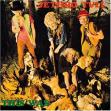
From "This Was", in 1968, their debut album. Jethro Tull's roots go back to 1963 when they were formed in England by vocalist/flautist/guitarist Ian Anderson. The band evolved out of The Blades, which in turn evolved into John Evan Band and John Evan Smash. The original Jethro Tull line-up included bassist Glenn Cornick, (who replaced Jeffrey Hammond-Hammond) drummer Clive Bunker (who replaced John Evan, who then switched to keyboards, appearing with the band from their "Benefit" album onwards), and guitarist/vocalist Mick Abrahams, together with Ian Anderson. They signed to Island Records and they released the featured album to much acclaim. They became a very popular live act, mainly due to Anderson's dynamic stage presence and distinctive one-legged stance. Mick Abrahams left in November 1968 to form Blodwyn Pig. He was briefly replaced by Tony Iommi of Black Sabbath fame and Davy O'List of The Nice, but Martin Barre joined the band as a permanent replacement from their "Stand Up" album (1969) onwards (he joined them on their first US tour, and is with the band to this day). "Benefit", the band's third album, proved to be the last album that Glenn Cornick would appear on. He left and later formed Wild Turkey, recording two great albums with them in 1971 and 1972. (Wild Turkey reformed for a short while in the 90's). Cornick was replaced by the returning Jeffrey Hammond-Hammond. John Evan guested on "Benefit", and he ended up staying with the band for ten years! Mention the name Jethro Tull and most people think of "Aqualung", arguably their best and best known album, which came out in 1971 (although "Crest Of a Knave" gives it a serious run for it's money!). Later members of Jethro Tull included the late John Glasscock, Eddie Jobson, Dave Mattacks, Doane Perry, Andy Giddings, Jonathan Noyce and others, all of whom have contributed much to this legendary band and its charismatic leader, who has also released a number of solo albums.
04). Chicken Shack - Revelation
From ''Unlucky Boy", in 1973, their 6th album, and second album for the Deram label. Chicken Shack were, like Fleetwood Mac, Savoy Brown, Climax Blues Band and others, one of the early British blues bands. Formed in Birmingham in 1965, they had a long residency at Hamburg's famed Star Club. The original members included guitarist/vocalist Stan "The Man" Webb, drummer Al Sykes (later replaced by Dave Bidwell), bassist Andy Sylvester and vocalist Christine Perfect (ex-Sound Of Blue, later to leave Chicken Shack and marry John McVie, joining him in Fleetwood Mac). The band's debut album, ''Forty Blue Fingers, Freshly Packed And Ready To Serve", was released on producer Mike Vernon's fame Blue Horizon label in 1968, and for the next couple of years, they were, together with Fleetwood Mac, at the forefront of the British blues boom. They released a further three albums, ''O.K.Ken", ''100 Ton Chicken" and ''Accept" for Blue Horizon before moving over to Deram in 1972. By the time the featured album came around, Chicken Shack had adopted a markedly rockier style, beginning with their 'Imagination Lady" album, although their blues roots were still very much in evidence. Joining Stan The Man on this album were (the late)Tony Ashton (Ashton, Gardner and Dyke)on piano, Chris Mercer (Juicy Lucy)on saxes, Paul Hancox on drums and Australian Bob Daisley (ex-Kahvas Jute)on bass. Unfortunately, after a German tour that was plagued with problems, Webb split the band, and he went on to feature with Savoy Brown (together with Kim Simmonds and Miller Anderson - The Boogie Brothers!), and Broken Glass, although he revived Chicken Shack in the late seventies. The band, which featured musicians such as Ed Spevock (drummer, ex-Babe Ruth), Paul Raymond (keyboards, ex-Savoy Brown), Ric Lee (drummer, ex-Ten Years After), and a host of others at various times, went on to release albums such as "That's The Way We Are", "The Creeper", ''Roadies Concerto" and others during the late seventies and early 80's. Other albums such as ''39 Bars", ''Webb's Blues", "Plucking Good", "Changes" and a number of great live albums, have ensured that Stan "The Man" Webb remains one of the UK's best and respected, but sadly underrated, guitarists,
05). Rory Gallagher - Do You Read Me
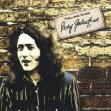
One of the finest guitarists who ever lived. Rory Gallagher was born on the 2nd of March 1949 in Ballyshannon, County Donegal, in Ireland. He started playing guitar at the age of 9 and after appearing in a number of school bands, he joined The Fontana Showband (later changed to The Impact Showband) in his mid teens. This band later evolved into his first major band, Taste, which he formed with bassist Eric Kittringham and drummer Norman Damery in August 1966. He recorded four albums with Taste before embarking on his successful solo career in 1971. (Later Taste members, bassist Charlie McCracken and drummer John Wilson went, on to form the excellent but unknown Stud, with guitarist Jim Cregan). Prior to his untimely death from complications related to a liver transplant on June 14th, 1995, this modest and shy, but brilliant and respected blues/rock guitarist, who suffered from stagefright for most of his life, released a number of excellent albums. The featured track was taken from "Calling Card", which was released in 1976, and which featured Rod de 'Ath on drums, Gerry McAvoy on bass and Lou Martin on keyboards. The blues/rock world has never been quite the same since his passing. Other recommended albums include "Fresh Evidence", ''Irish Tour '74"(which is also available on dvd), "Blueprint" and "Photo Finish".
06). McKenna Mendelson Mainline - Beltmaker
This progressive blues outfit were formed in Toronto, Canada, in 1968 by guitarist Mike McKenna (previously with Luke and The Apostles, in 1963, and The Ugly Ducklings, in 1967/8), and guitarist/vocalist Joe Mendelson. Original bassist Denny Gerrard (of The Paupers fame) left after three months and he was replaced by Mike Harrison, and Tony Nolasco was recruited on drums. Although they were quite popular in Canada, they relocated to England in 1968, where they aroused a lot of interest. Whilst in England, they recorded their sole album, "Stink", in 1969, from which the featured track was taken. The band then returned to Toronto and evolved into Mainline, recording three great albums under that name. Nolasco and McKenna later went on to form Diamondbacks. (An album of previously unreleased-on-CD-material, recorded in September 1968, under the name of McKenna Mendelson Blues, was released in 1996).
07). Spring - Golden Fleece
Arguably the finest progressive rock album to emerge from the UK in the 70's. Released on RCA's progressive Neon label, alongside Dando Shaft, Tonton Macoute, Indian Summer, The Running Man and others, this brilliant album of classy mellotron-drenched, well written tunes, is very rare and highly sought after by collectors. The band was formed by vocalist/mellotron player Pat Moran, keyboard player Kips Brown, guitarist Ray Martinez, bassist Adrian Maloney and drummer Pique Withers (who went on to be a founding member of Dire Straits). It's been said that this album defends the right for progressive rock's existence. The album was released on Laser's Edge Records (and Repertoire, a few years later, with the Italian Akarma label getting in on the act too), together with three previously unreleased tracks for a mooted second album which unfortunately never materialized. A great pity, because if those three tracks were anything to go by, a second Spring album would have been a scorcher.
If there was ever a top 10 list of essential progressive rock albums that any aficionado should have in his or her collection, Spring's self-titled album simply HAS to be there.
08). Subject ESQ. - 5'13
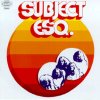
This little-known German outfit, who were formed in Munich in the early 70's, released just the one self-titled album on the Epic Record label in 1972. They played a very complex style of progressive rock with classical and jazz undertones, similar in style to bands like Caravan, Camel and Holland's Alquin. Flautist/sax player/vocalist Michael Hofmann, harp player/vocalist Alex Pittwohn, drummer Harry Rosenkind and bassist/vocalist Stefan Wissnet, together with ex-Out of Focus keyboard player Hennes Hering, went on to form the more popular Sahara in 1973.
09). Fuzzy Duck - More Than I Am
Original copies of this English band's sole self-titled album, released on the rare MAM Record label in 1971, are worth big bucks on the collector's market. Only 500 copies were apparently pressed. Musically, they can best be described in the heavy progressive mould, with great organ work from Roy Sharland (ex-Spice and Arthur Brown). The other members were ex-Tucky Buzzard drummer Paul Francis, guitarist/vocalist Grahame White (who left to join Capability Brown, just as the album was released. His replacement was Garth Watt-Roy, of Greatest Show on Earth et al fame), and ex-Andromeda/Five Day Week Straw People and future Ten Years After bassist Mick Hawksworth. The band folded at the end of 1971.
10). Jack Hammer - Headlines

One of South Africa's best known blues/rock bands, formed by guitarist vocalist Piet Botha, and featuring guitarist/vocalist Johnathan Martin, drummer Paul van de Waal and bassist Tertius du Plessis. The track was taken from their latest album, ''The Pilgrim", which came out earlier this year. Jack Hammer, who have been around for a number of years, supported Deep Purple and Uriah Heep when they visited South Africa about eight years ago.
11). Van Zant - Been There Done That
Taken from ''Get Right With The Man", released earlier this year, the third album from the Van Zant brothers, Donnie from .38 Special and Johnny from The Johnny Van Zant Band and Lynyrd Skynyrd (the other two albums are "Van Zant 2" and ''Brother To Brother"). Both very accomplished musicians (vocalists) in their own bands, the brothers sound great and compliment one another with their different styles. It's an album of country rock music, similar in style to The Marshall Tucker Band and others.
12). Charlie Daniels Band - Even Up The Score
Fiddle player/guitarist and vocalist Charlie Daniels first rose to prominence in the early 70's when he was recording and touring with The Marshall Tucker Band. Born on October 28th, 1936, he was and is still highly regarded as "The Godfather of Southern Rock", although he's done it all: country, rock, gospel, pop, instrumental, ballads and bluegrass. Before forming The Charlie Daniels Band in the early 70's, he'd previously formed and featured in bands such as The Rockets, The Jesters and others. He also cut his teeth working with the likes of Al Kooper, Ringo Starr and Leonard Cohen. His debut album under the Charlie Daniels Band name, ''Te John, Grease and The Wolfman", was released in 1972 on the Kama Sutra label, and although the album attracted some attention from the radio and public, it didn't quite reach the heights he would have wanted. Subsequent albums such as ''Uneasy Rider'' and ''Million Mile Reflections", which spawned one of his biggest hits, "The Devil Went Down To Georgia", really put him on the map. He went on to release many albums of different styles and is still around today. The featured track, which was written by guitarist/vocalist Bruce Brown, was taken from the band's ''Road Dogs" album, released in 2000, on the Blue Hat Record label. Other featured musicians are long-time Charlie Daniels Band members Taz DiGregorio on vocals and keyboards and bassist Charlie Hayward, together with drummer Pat McDonald and guitarist/vocalist Chris Wormer. The track is certainly a contender for one of the greatest "Southern Rock" tracks ever written!
13). Samson - Losing My Grip
Samson were one of the early bands of the NWOBHM (New Wave of British Heavy Metal) scene. Guitarist Paul Samson formed the band in 1979 with Chris Aylmer on bass, Clive Burr on drums and Bruce Bruce (Bruce Dickinson) on vocals. Burr soon left to join Iron Maiden, and he was replaced by the masked Thunderstick. This line-up released the band's debut album, ''Survivors", which was released in 1979. Three further albums, each one becoming minor classics of the genre, namely "Head On", in 1980, "Shock Tactics" in 1981 and the featured album, 1982's "Before The Storm", were released, with the latter featuring new vocalist, Nicky Moore, previously with Megaton, Hackensack and Tiger. Bruce Dickinson left Samson to join Iron Maiden, and debuted on their ''The Number Of The Beast" album in 1982. Samson's energetic stage act featured Thunderstick (real name Barry Graham), who's drum kit was enclosed in a cage on stage (Thunderstick left the band around the same time as Dickinson. His replacement was Pete Jupp). The line-up of Paul Samson, Nicky Moore, Chris Aylmer and Pete Jupp was probably the band's best, with three great albums being recorded between 1982 and 1985, which was arguably the band's best period.
The featured track was taken from their excellent ''Before The Storm", released in 1982. The follow-up album, ''Don't Get Mad Get Even", released in 1984, was equally as good, but the live "Thank You And Goodnight", released the following year, with Merv Goldsworthy (ex-Diamond Head) on bass, must rate as one of the best live albums to come out of the NWOBHM scene. The band then folded, with Paul Samson electing to embark on a solo career, working with the likes of bass guitarist John McCoy (of Zzebra and Gillan fame, later to form Mammoth, with Nicky Moore). Pete Jupp and Merv Goldsworthy went on to form FM. Paul Samson revived Samson in the late 80's, with a completely new line-up, and released ''Refugee" in 1990. Subsequent albums such as "Joint Forces" and 1993's self-titled album are both competent releases. Nicky Moore and Paul Samson revived the glory days of the band in the late 90's, together with Chris Aylmer and Thunderstick, and this line-up released the excellent "Live in London 2000". He also released a great live blues album, "Live - The Blues Nights", in 2001, but he sadly passed away a few years ago, just when it seemed that he'd found fame and fortune with the new reformed Samson.
14). Saxon - Ride Like The Wind
Another one of the early NWOBHM bands. Saxon were formed in the late 70's, originally as Son Of a Bitch. The original line-up centered around vocalist Biff Byford, drummer Pete Gill (ex-Glitter Band), bassist Steve Dawson and guitarists Paul Quinn and Graham Oliver. They changed their name to Saxon and released their eponymous album in 1979 on the Carrere label and they were an instant hit, thanks to support slots on several major tours with Motorhead and Nazareth. Subsequent albums such as "Wheels Of Steel", "Strong Arm Of The Law" and "Denim and Leather" ensured that by the time they played at the 1981 Monsters Of Rock festival, they'd built up a large and loyal fan base. Nigel Glockler (ex-Toyah) had replaced Pete Gill (who went on to feature with Motorhead). The longer Saxon continued to record and tour, the better they became, releasing excellent albums such as ''Power and The Glory", "Crusader" and "Destiny", from which the featured track, a great cover of Chris Cross's mega hit, was taken, in 1988. Having gone through a number of line-up changes over the years, as well as the odd lawsuit due to infighting, the "core" Saxon are still around today, plying their trade and releasing albums of a consistently high quality, as is evident on their latest studio album, ''Lionheart", and on the double "The Saxon Chronicles" dvd, released a few years ago .
15). Iron Maiden - The Trooper
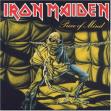
From ''Piece Of Mind" in 1983, the second album to feature vocalist Bruce Dickinson, who had previously been in Samson. Iron Maiden are without doubt the best known band of the NWOBHM scene. Formed in London in 1976 by bassist Steve Harris, they were named after a Medieval torture device. The initial line-up was Steve Harris on bass, vocalist Paul DiAnno, Dave Murray on guitars and Doug Sampson on drums (later replaced by Samson's Clive Burr), with second guitarist Dennis Stratton being added a bit later on. They were signed to EMI Records and they released their self-titled debut album in April 1980. It reached number four on the UK albums charts and it signaled the start of Iron Maiden's progressive rise to stardom. Stratton then left (to later join Praying Mantis) and was replaced by ex-Urchin guitarist Adrian Smith. This line-up embarked on a massive tour, after which DiAnno left (to form his own band Dianno, and then Battleaxe), to be replaced by Bruce Dickinson of Samson fame. Nicko McBrain (of French band Trust), replaced Clive Burr in 1982, and the line-up of Dickinson, Murray, Smith, Harris and McBrain, went on to record a number of successful albums during the next seven or so years. Adrian Smith then left to form ASAP (Adrian Smith and Project), and he was replaced by Janick Gers, formerly of White Spirit, Gillan and Fish (Marillion). Bruce Dickinson released his first solo album "Tattooed Millionaire" in 1990, and he would later leave Iron Maiden for a number of years to follow his solo career, his replacement being Blaze Bailey of Wolfsbane. Bailey was with Maiden for a few years before Dickinson returned, as did Adrian Smith, although Gers's services were retained. The idea of a three guitar line-up in Iron Maiden was mouthwatering to say the least, and their "Brave New World'' led credence to that notion: Maiden were sounding better than they ever had! The new "reformed" line-up appeared on the double "Rock In Rio" dvd a few years ago. Brilliant stuff from a seriously good and powerful band, who are still around today. Their latest double live album (which was given a very short review on The RockIt Scientist website a few months ago), called "Death On The Road", is testimony to the fact that the Irons are still up there with the best of them.
16). Tygers of Pan Tang - Silver and Gold

Another great UK metal band, who evolved from a Tyneside-based punk band called Trick, in 1976. Electing to follow a heavier direction, they adopted the name "Tygers of Pan Tang" (taken from Michael Moorcock's "Stormbringer" novel). The initial members were Brian Dick (drums), Mark Butcher (vocals), Robb Weir (guitar) and Rocky Laws (bass), although Butcher was soon replaced by Jess Cox (ex-Willy and the Werewolves). By mid 1979, the Tygers, as they became known, had built up quite a good following and they started putting tracks together for what would be their debut album. Their first single, ''Don't Touch Me There", released on the newly formed Neat Label, was very well received. They were then offered terms by MCA Records, and they released their debut album, ''Wild Cat", in 1980. Jess Cox then left the band and was replaced by ex-Persian Risk vocalist Jon Deverill. John Sykes (ex-Streetfighter) was added as a second guitarist and the new look quintet released the brilliant "Spellbound" in 1981, from which the featured track was taken. The Tygers were on a roll now, and the same line-up released ''Crazy Nights" in 1982, although John Sykes then departed for a short spell with John Sloman's Badlands before joining Thin Lizzy, and later, Blue Murder and Whitesnake. The rest of the group then set about finding a replacement for Sykes, eventually recruiting ex-Penetration guitarist Fred Purser. The resulting album, "The Cage", was arguably the band's finest offering to date, and it opened them up to the US market. Unfortunately the band's relationship with MCA Records soured and they spent the next two years extricating themselves from various contracts. In the interim, only Brian Dick and Jon Deverill remained from the earlier line-up, with new members Steve Lamb and Neil Shepherd on guitars and David Donaldson on bass and backing vocals, joining in 1985. The band were now signed to Music For Nations, and they released the disappointing "The Wreck-Age" album that year. Two further albums, ''First Kill'' and ''Burning In The Shade" were released before Tygers of Pan Tang split in 1988. Original members Jess Cox and Robb Weir formed the short-lived Tyger Tyger in 1986, but with little success, but Cox and Weir then reformed Tygers of Pan Tang and they released a great live album, ''Live at Wacken", with new members Gav Gray, Glen Howes and Chris Percy, in 2001. A further album, ''Mystical", with Robb Weir as the only original member, was released a few years ago, and there have been other releases since, including a live DVD called "Visions From The Cathouse". Jess Cox is now the owner of Neat Records.
17). Solarplexus - Phrygian Samba
Solarplexus were a Swedish jazz rock outfit, formed in the early 70's, by two ex-members of Made in Sweden, namely guitarist/bassist Georg Wadenius and drummer Tommy Borgudd, together with keyboard and flute player Carl-Axel Dominique and keyboard player/vocalist Monica Dominique. Their music was very varied, encompassing elements of jazz, classical, rock, beat and Swedish folk music. Georg Wadenius was later offered the guitarist position in Blood, Sweat & Tears, which he eagerly accepted. He was replaced by two new members, Bosse Haggstrom and Tommy Korberg, but the band had lost their magic. They released a total of four albums between 1972 and 1975. The track was taken from their self-titled debut, released in 1972.
18). Junipher Greene - Magical Garden
Junipher Greene were a Norwegian progressive rock band who were formed in Oslo in 1967. They released their ambitious debut album, a double lp, called ''Friendship", in 1971, from which the featured track was taken.(It was quite rare for any band to release a double as a debut album!). The initial line-up included Bent Aserud on guitars, keyboards, flute and vocals, Geir Bohren on lead vocals, drums and sax, Helge Groslie on keyboards, Freddie Dahl on guitar and vocals and Oyvind Vilbo on bass. They were one of Norway's best bands, although they only released two albums before splitting in the mid 70's. Two compilation albums, "Best of" (1975) and ''Rewind", (1981), which also featured a number of unreleased tracks circa 1969, were issued. Helge Groslie left to join Titanic in 1972. Aserud and Bohren kept the Junipher Greene name for various incarnations during the 80's, although these were very different to the original group. They've since built up a reputation as the creators of Norwegian movie soundtracks.
19). Skin Alley - Walking In The Park
This great Graham Bond-penned number, which was also covered by Colosseum, was taken from "To Pagham and Beyond....", in 1970, their second album. This great UK progressive rock outfit were formed in the late 60's by keyboard player Krzysztof Juskiewicz, guitarist/sax/flute player/vocalist Bob James (no, not THAT Bob James!), bass guitarist Thomas Crimble and drummer Alvin(Giles)Pope. Their now quite rare self-title debut album, released on CBS Records, came out in 1969. The track "Living In Sin", from the debut album, appeared on the popular CBS double compilation "Fill Your Head With Rock" in 1970. In August of 1970, vocalist/flautist/bass/keyboard player Nick Graham, who'd been in Atomic Rooster, replaced Thomas Crimble, and this line-up recorded the featured album. Skin Alley then left CBS Records and signed to Transatlantic Records. The following album, "Two Quid Deal", released in 1972, although less jazzy/bluesy that the first two albums, was nonetheless a great effort, with excellent contributions from Nick Graham. Alvin (Giles) Pope then left the band and was replaced by Tony Knight, ex-Bronx Cheer and Demick & Armstrong. The band's final album, "Skintight", was released in 1973. Skin Alley also appeared on the highly collectible "Revelations" triple album, alongside Hawkwind, The Pink Fairies, Mighty Baby and others. Nick Graham later appeared with Alibi in 1980.